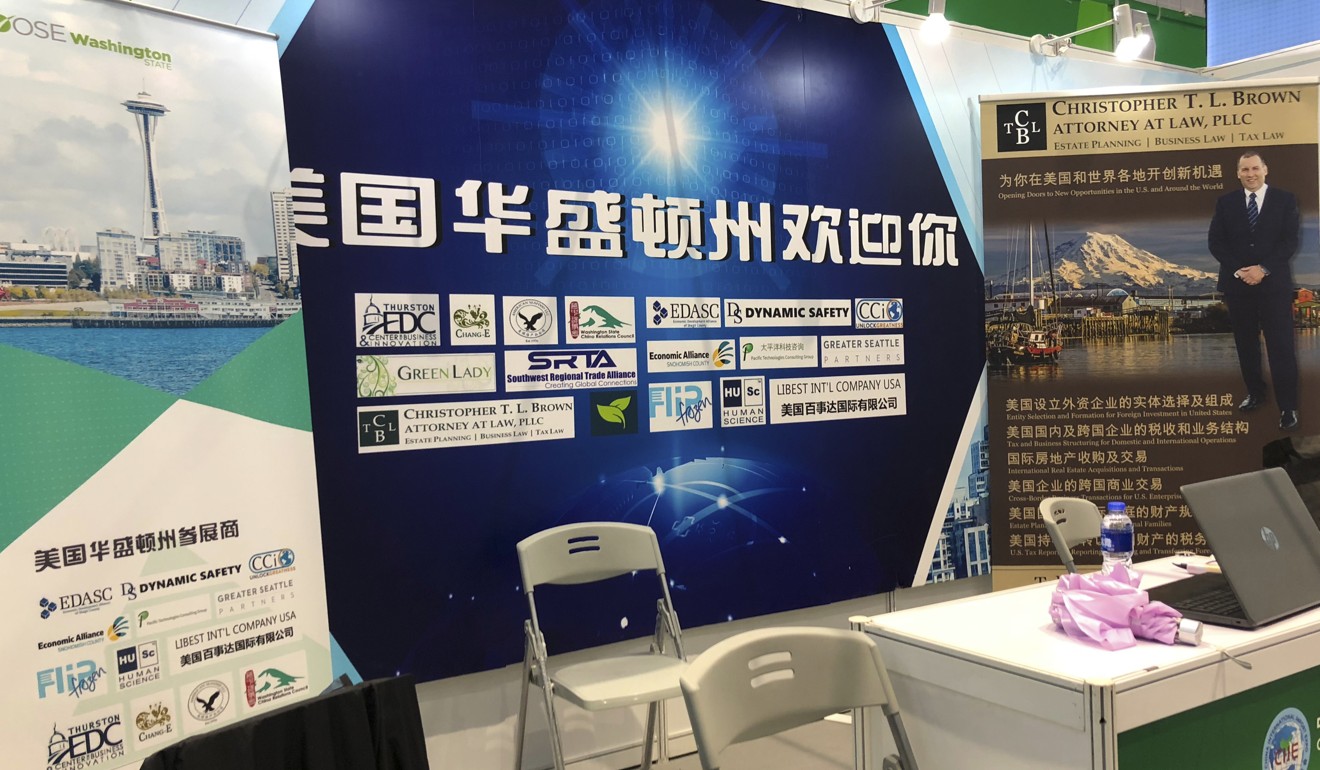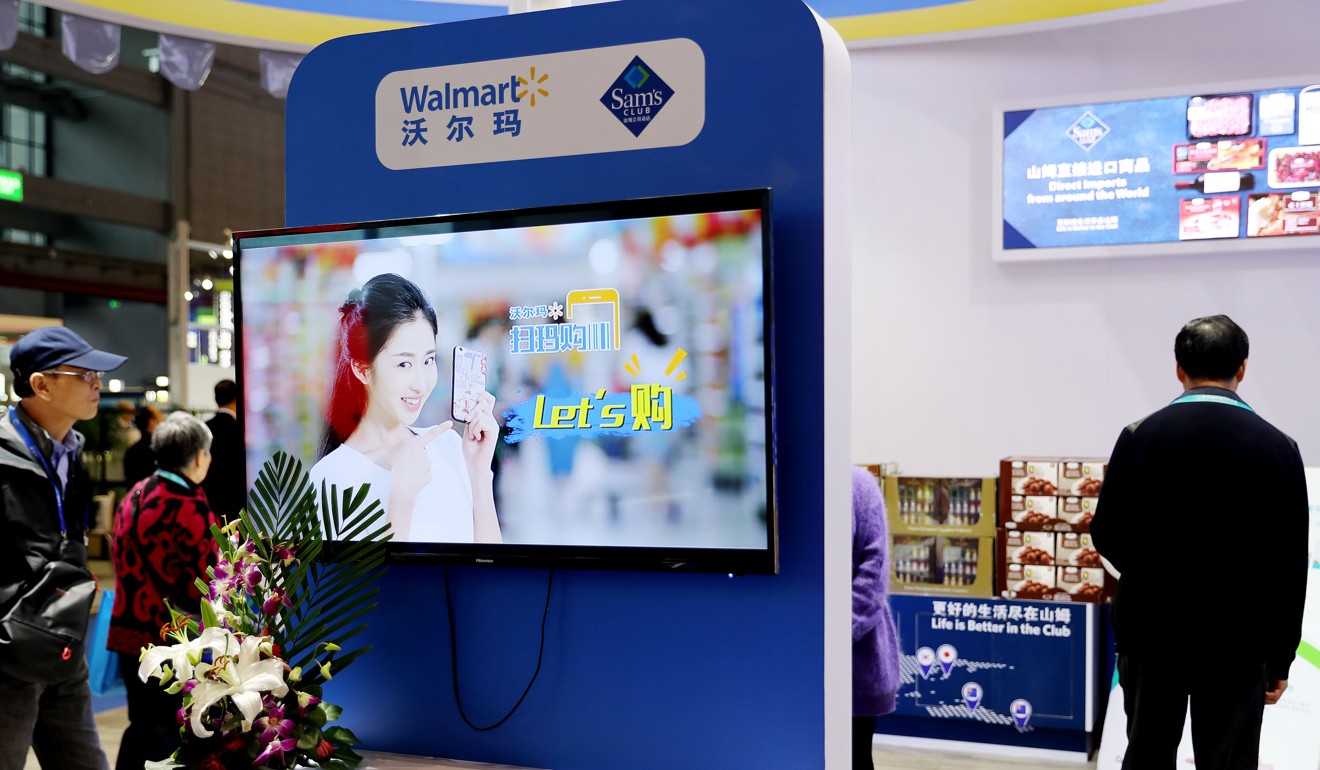
What trade war? US state representatives lining up business at China Import Expo
- American delegations exhibiting to build contacts to tap into the vast Chinese consumer market
- Even without national government’s endorsement, US has third-largest number of exhibitors at the week-long event
Representatives from the US state of Washington didn’t get the memo about the trade war.
The Pacific northwest state has sent a 30-strong trade delegation representing local government, business groups and companies to the inaugural China International Import Expo this week to build trade ties in seeming defiance of US President Donald Trump’s attempt to pressure China into making trade concessions.
Eight Washington companies came to the expo, including a wine distributor, a manufacturer of commercial aircraft passenger seats, a law firm and a consulting service, setting up shop in the state’s main booth in the exhibition hall for food and agricultural products, which has usually been packed with people looking for a taste of their exotic foods.
Washington is one of a number of US exhibitors at the expo. While they may agree with some of the complaints at the core of the trade conflict between the US and China, they are also keen to build relationships in China so that they can tap into China’s vast consumer market once the trade war dust settles.
For now, these representatives are trying to maintain their business contacts in the hope that better days lie ahead.
Home to Microsoft’s headquarters and Boeing’s largest production facility, Washington is one of the top US states exporting to China, shipping a total of US$17.9 billion worth of goods last year, based on statistics from the US Census Bureau.
Shipments to China alone accounted for more than a fifth of the state’s annual exports. The state also boasts, in Seattle, one of the busiest container ports in the US. About a third of jobs in the state are related to international trade, according to the state government.
“My understanding is that the Chinese government has made an intentional effort to demonstrate to the world that they want to be the buyer of products,” said Chris Green, assistant director of economic development and competitiveness at the state department of commerce.

“So this is about the Chinese economy and also about how China will participate in the global economy.
“China is our state’s No 1 trading partner. For us, it made sense to come to this show, trying to bring
more companies to continue building connections to Chinese companies.”
County-level business representatives have had brief private meetings with a few local Chinese officials from cities and municipalities – including Qingdao in Shandong province, Dongtai and Lianshui in Jiangsu province, Zhumadian in Henan province and Haiyan Economic Development Zone in Zhejiang province – to introduce investment and partnership opportunities in the state.
“One thing we have to explain [in the meetings] is the difference between the concept of a county in Washington state and the concept of a county in China, because in many US states the government starts at state level, and then it’s the county, then the city, which tends to be smaller, whereas in China, it’s the opposite [city is higher than county],” said Sean Connell, director of Economic Development Alliance of Skagit County, which is known for its seed production and tulip plantations.
“It’s important because in Washington state, many economic development projects are coordinated on a county by county basis.”
Washington state estimated the additional tariffs from the escalating trade war had so far affected nearly US$2 billion worth of state goods shipments, even though there has not been a significant negative impact on the local economy to date. However, the state government is nervous about the outlook.
“We do worry about that,” Green said. “If these tariffs stay in place for a long time, we do have some concerns that it’s going to be bad for the overall economic health of the state.
“It’s not like we’ll have a massive economic shift, where a whole industry disappears, but we have companies that are experiencing a lot of pressure that have to find different places to sell their products.

“Those are shifts in the supply chain that we worry about because if you make a big shift like that, it’s hard to change back.”
Were aircraft still on the list of US$50 billion worth of goods on which China imposed 25 per cent retaliatory tariffs, it would deliver a blow to Snohomish county, where giant aircraft manufacturer Boeing has its largest production facility, making the company’s largest planes. Beijing took aircraft off the list before the tariffs were implemented in July.
Civilian aircraft and engines account for more than half of Washington’s exports to the rest of the world. The state’s other top export goods include wheat, potatoes, apples and cherries.
“For Snohomish county, 60 per cent of our jobs are tied to trade, directly or indirectly,” said Patrick Pierce, chief executive of Economic Alliance of Snohomish County.
“While at the highest level of government there may be disagreements and tensions now on trade, that doesn’t mean we shouldn’t have dialogue and relationships with our Chinese partners.”
Small businesses like Chang-E, one of the Washington companies exhibiting at the expo, have taken a hit from the trade war. It represents six state wineries as their sole distributor in China.
After China imposed a 25 per cent tariff on US alcohol imports, Jenny Chang, the company’s owner, had to sacrifice some of her profit to keep existing customers and gain new ones.
“My job is to introduce different wines to people who really want to try good wine and also healthy wine, so I am doing everything to lower the cost on my end so that people can still enjoy it,” Chang said.
Even without a national government endorsement, the US still has a relatively large presence at the expo, ranking third in its number of exhibitors after Japan and South Korea.
Firms from states controlled by Republican politicians, where Trump’s protectionism gains popularity, nonetheless registered for the import fair.
Terry Reynolds, vice-president of sales at Snake River Farms, a beef producer from the northwestern state of Idaho, manned a booth alongside a representative from its Chinese importer, the state-owned China National Cereals, Oils and Foodstuffs Corporation.
Reynolds’ firm had a strong sales debut in China earlier this year, but business slowed down after China raised tariffs on beef in July. “We are kind of just in a waiting period,” Reynolds said.
However, nearby, the booth for Dogfather Gourmet Hot Dogs, an exhibitor from Arizona, has been vacant for the entire week of the expo, with no representative attending.
“It would be interesting to see, towards the end of the show, whether or not the expo is successful in creating transactions,” state representative Green said.
“Some of these companies [from Washington state] need to take time to build relationships, to meet their clients. But our hope is that we will have some companies that actually make some business deals.”

